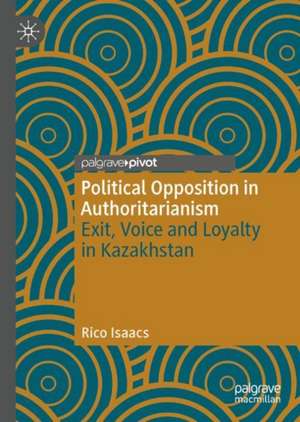Political Opposition in Authoritarianism: Exit, Voice and Loyalty in Kazakhstan: The Theories, Concepts and Practices of Democracy
Autor Rico Isaacsen Limba Engleză Hardback – 14 aug 2022
Preț: 352.63 lei
Nou
Puncte Express: 529
Preț estimativ în valută:
67.47€ • 70.70$ • 55.78£
67.47€ • 70.70$ • 55.78£
Carte tipărită la comandă
Livrare economică 11-25 aprilie
Preluare comenzi: 021 569.72.76
Specificații
ISBN-13: 9783031065354
ISBN-10: 3031065352
Pagini: 160
Ilustrații: XIII, 160 p. 3 illus., 1 illus. in color.
Dimensiuni: 148 x 210 x 19 mm
Greutate: 0.36 kg
Ediția:1st ed. 2022
Editura: Springer International Publishing
Colecția Palgrave Macmillan
Seria The Theories, Concepts and Practices of Democracy
Locul publicării:Cham, Switzerland
ISBN-10: 3031065352
Pagini: 160
Ilustrații: XIII, 160 p. 3 illus., 1 illus. in color.
Dimensiuni: 148 x 210 x 19 mm
Greutate: 0.36 kg
Ediția:1st ed. 2022
Editura: Springer International Publishing
Colecția Palgrave Macmillan
Seria The Theories, Concepts and Practices of Democracy
Locul publicării:Cham, Switzerland
Cuprins
1. Introduction: Authoritarian Institutions, Regimes and Political Opposition.- 2. Defining, Conceptualising and Theorising Opposition-Regime Relations in Authoritarian Regimes.- 3. Exit, Voice, Loyalty: An Analytical Framework for Opposition Agency in Authoritarian Regimes.- 4. The Development of a Personalist-Authoritarianism Regime in Kazakhstan.- 5. Exit, Voice and Loyalty: Opposition Strategies and Choice from above in Kazakhstan.- 6. Non-Oligarchic Public Voice in Kazakhstan from Below 2011-2022.- 7. Conclusion.
Recenzii
“Isaacs’ book is recommended for everyone interested in the politics of Kazakhstan. It provides a broad picture of developments within the political regime, rich empirical descriptions and an overview of the relevant literature. At the same time, it contributes to the broader conceptual and theoretical literature with a concise typology of political opposition in authoritarian regimes and with an important causal mechanism explaining the relationship between political regimes and opposition movements over time.” (Heiko Pleines, Europe-Asia Studies, August 31, 2023)
Notă biografică
Rico Isaacs is Professor of International Politics at the University of Lincoln, UK. His research interests lay at the intersection of authoritarianism, culture and political theory in post-Soviet states with a particular focus on the Central Asian Republics. He is the author of Film and Identity in Kazakhstan (2018) and Party System Formation in Kazakhstan: Between Formal and Informal Politics (2011), as well as authoring several co-edited volumes, including most recently The Routledge Handbook of Contemporary Central Asia (with Erica Marat, 2021) and a Critical Reader in Central Asian Studies (2022). Rico is also the current serving editor of Central Asian Survey.
Textul de pe ultima copertă
How might political opposition shape regime outcomes over time in an authoritarian system? Most studies on political opposition in authoritarian contexts tend to focus on the agency of the regime over and above that of the political opposition. Using Albert Hirschman’s framework of exit, voice and loyalty, this book examines the case of Kazakhstani opposition agency over 30 years to explore the extent to which political opposition in Kazakhstan has shaped the dynamics of authoritarian regime development in the country. What the analysis reveals is that in Kazakhstan the regime has tended to treat formal institutional political opposition as neither a credible nor non-credible threat. Consequently, the Kazakhstani regime has always responded to opposition exit and voice with sanctions and institutional adaption which strengthened the regime in the short to medium term, but left them exposed to spontaneous, grassroots non-institutional opposition in the longer term. This spontaneous grassroots opposition emerged in Kazakhstan as a series of ‘shocks’ crystalised in the 2011 events in Zhanaozen, the 2016 land protests, the 2019 election protests and the events of ‘qandy qantar’ (bloody January) in 2022. What this book illustrates is how authoritarian regimes which treat opposition threats ambiguously are likely to end up in a continuous state of instability because the feedback provided by opposition agency disappears leaving the regime susceptible to spontaneous opposition.
Rico Isaacs is Professor of International Politics at the University of Lincoln, UK.
Rico Isaacs is Professor of International Politics at the University of Lincoln, UK.
Caracteristici
Offers the first monographic account specifically dedicated to the development of political opposition in Kazakhstan Based on 100 in-depth interviews with key political actors and specialists over the last decade Offers a new perspective on understanding opposition agency in authoritarian regimes













